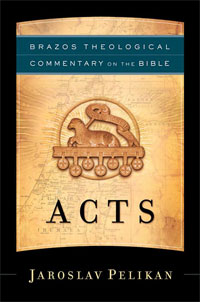Book Notes
 Jaroslav Pelikan, Acts; Brazos Theological Commentary on the Bible (Grand Rapids: Brazos, 2005), 320pp.
Jaroslav Pelikan, Acts; Brazos Theological Commentary on the Bible (Grand Rapids: Brazos, 2005), 320pp.
Any new book by Jaroslav Pelikan is an automatic read for me. I cannot think of another writer whose erudition in the service of the church fires my mind and soul more than him. Magisterial, meticulous, encyclopedic, prolific, and prodigious, Pelikan is the Sterling Professor Emeritus of History at Yale University where he served on the faculty from 1962–96, the past president of the American Academy of Arts and Sciences, and in 2004 the recipient of the Library of Congress's annual John W. Kluge Prize in the Human Sciences (the $1 million award focuses on academic disciplines not covered by the Nobel prizes). Most in his guild would consider him the greatest historian of Christian thought in his generation.
Born in 1923, and showing no signs of scholarly fatigue, Pelikan converted from his Lutheran heritage to Eastern Orthodoxy a few years ago (he dedicates this volume "To my liturgical family at Saint Vladimir's"), and so this book, like many of his recent publications, exemplifies his hearty and unapologetic embrace of Christian orthodoxy. Noting that even the most extravagant claims made about the Bible enjoy their moment in the sun, Pelikan admits that this commentary "is based upon what may turn out to be the most radical presupposition of all: that the church really did get it right in its liturgies, creeds, and councils—yes, and even in its dogmas."
Pelikan's volume is the first in this Brazos series that will publish distinctly theological commentaries, as opposed to traditional exegetical commentaries written by Old and New Testament technical specialists. Stanley Hauerwas of Duke, for example, is writing the volume on the Gospel of Matthew. Pelikan's method, then, is refreshingly different than most commentaries. For each of the twenty-eight chapters in the book of Acts he focuses on three distinct theological themes. Acts 15, for example, provides opportunity to discuss controversy and polemics, along with the emergence of creeds and councils, while for Acts 17 natural revelation takes center stage. The eighty-four themes traverse most all of Christian theology.
In Acts 1:4 the disciples were instructed "not to depart from Jerusalem" until so instructed, then in the final chapter we read "and so we came to Rome" (28:16). "Six monosyllables in English (though not in Greek)," writes Pelikan, "this sentence is the signal that the Way (11:26) was being transferred—or rather, already had been—to a world stage and was no longer hidden 'in a corner' (26:26). These words from the first chapter and from the last chapter are the bookends of the Acts of the Apostles" (p. 290). Whether treating matters of history, theology, rhetoric, philology, the Greek and Roman classics, textual variants, creeds, councils, art, music, and the early mothers and fathers of the church, Pelikan displays a deft and judicious touch, an eloquent writing style, a staggering command of the sources, and a sensitivity for "the predicament of the Christian historian" (Florovsky, p. 279) who must abide by the canons of his discipline while not suppressing his own vibrant faith commitment (Pelikan likens it to a young doctor doing brain surgery on his mother)—all of which inspire confidence in the Gospel of Jesus Christ as proclaimed by the one, holy, catholic and apostolic church.


